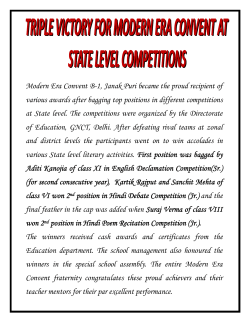
बदलना â to change - The Hindi Urdu Flagship at the University of
! बदलना — to change ! बदलना means to change — which is perhaps nothing to get very excited about. But this everyday verb has two points of interest that make it stand out from the herd. Firstly, बदलना, which derives from Arabic badal, is one of a surprisingly small group of Hindi verbs in which a non-Sanskritic loanword becomes a Hindi verb stem. Others include ख़रीदना (Persian kharīd) and Rajiv Gandhi’s spontaneous coining ल)ज़ना (English ‘to lose’). Hindi does not usually follow this pattern of using a loanword as a verb stem, preferring to embed the loan in a phrase verb using करना or होना, such as ब.द करना or ब.द होना — there is no *ब.दना. (ब.द is from Persian.) Secondly, बदलना carries both intransitive meaning (भाषा बदलती 2 Language changes) and transitive meaning (हम अपनी मात6भाषा नह7 बदल सक9 We cannot change our mother-tongue). Such duality of verbal function is common enough in English, where the verb to cook can have either the food or the chef as subject, but is much less common in Hindi, which favours separate verbs of related stem such as पकना/पकाना to cook, स)खना/सuखाना to dry, ट=टना/तोड़ना to break. The two-facedness of a verb such as बदलना cannot be tolerated for long, and Hindi is quick to distinguish the two different functions through the use of compounds: बदल जाना intransitive, बदल @ना transitive! As usual, we turn to OHED for an overview of meanings, starting at the root with the noun बदल and then following through with the verb and other derivatives. बदल badal [A. badal], m. 1. change; exchange, substitution. 2. return, retaliation. 3. reg. = बदला, 5. — करना, to exchange (with, or for, A साथ, or C); to substitute (for, C). - िज़ला-बदल, m. change of district, or residence. बदलना badalnā [cf. H. badal], v.i. & v.t. 1. v.i. to change, to be changed; to vary; to be transformed. 2. to be exchanged (for sthg. else). 3. to be removed; to be transferred; to be transplanted. 4. to change for the worse; to look older; to fade. 5. v.t. to change (sthg.), to alter; to transform; to disguise. 6. to exchange (for, C); to barter. 7. to remove; to transfer; to transplant. 8. to misrepresent (a meaning, an intention). 9. to shift (one’s ground). बात, to prevaricate. बदलवाई badalvāī [cf. H. badalvānā], f. = बदलाई. बदलवाना badalvānā [cf. H. badalnā], v.t. to cause to be changed, &c. (by, C); to change. बदला badlā [cf. A. badal], m. 1. exchange. 2. a substitute. 3. recompense; compensation; restitution. 4. return, retaliation; revenge; reprisal. 5. ppn. (w. A). in exchange or return (for). — करना (का)), to exchange (for, C) चuकाना, to exact a return (= Hना). @ना (को), to give in return; to make recompense, &c.; to give back what one gets, to retaliate. Hना, to take revenge (for, का, on, C); to get one’s own back, to retaliate. बदH I, adv. in exchange, &c. बदलाई badlāī [cf. H. badlānā], v.t. 1. exchange; barter. 2. sthg. given in exchange; a replacement. 3. price of exchange. बदलाना badlānā [cf. H. badalnā], v.t. = बदलवाना. — HINDI URDU FLAGSHIP — बदलाव badlāv [cf. H. badalna], v.t. exchange; replacement. बदलाहट badlāhaṭ [cf. H. badalnā], f. change; a change. 1 बदली badlī [cf. H. badlā], f. 1. change; exchange; substitution. 2. sthg. or someone exchanged; substitute; relief (of a watch). 3. transfer. — करना (की), to change; to exchange; to relieve; to transfer. I, adv. in exchange. This last headword, 1 बदली, is to be distinguished from a Sanskritic homonym: ! 2 बदली badlī [vārdalikā-], f. 1. cloudiness. 2. a small cloud. All these words are common in everyday use and in journalism, whose brief is, after all, to document change. Here are some internet headlines; the first four use the verb बदलना on its own, the remainder (after the chameleon) use it compounded with जाना, @ना, or Hना. बदलता भारत Changing India बदल रहा 2 थार का िमजाज The mood of the Thar desert [in Rajasthan] is changing कiठन नह7 L भाMय बदलना It is not hard to change [one’s] destiny चचO को बदलना होगा रवQया: पोप RSiसस The church will have to change its ways: Pope Francis ! ! iगरiगट की तरह र.ग बदलT वाला कभी सuख नह7 पाता A person who changes (colour) like a chameleon can never find happiness अUiरका T बनाई iदशा बदल HT वाली गोली America has made a direction-changing bullet Wया पाiकXतान हUशा A िलए बदल जाएगा ? Will Pakistan change for ever? Zी जी C बदल जाएगी मोबाइल फोन की ]iनया The world of the mobile phone will change with 3G दस साल I काफी बदल गया टीवी TV has changed a lot in ten years. Wया आपT अपना नाम बदल iदया 2 ? [context: passport renewal] Have you changed your name? — HINDI URDU FLAGSHIP — गजब! 30 iदन I अिखHश T बदल iदए 130 अफसर! Too much! In 30 days Akhilesh [Yadav, Chief Minister of UP] has substituted 130 officials! अगर आप का भी यही पासवडO 2 [123456] तो बदल दीिजए अभी If you have this same password [123456], change it immediately A derivative of बदलना lacking from OHED’s entries above is the derogatory term दलबदल) turncoat, all too useful in the context of rivalry between political parties (दल). It features the suffix -ū, which often carries a teasing denigration — as in nicknames such as मोट= Fatso, ल.ब) Lanky, छोट= Titch. Some turncoat headlines: Tताआe का दलबदल) bल, आज यहS − कल वहS ! The turncoat game of politicians: here today, there tomorrow! दलबदल) Tता पर हम Wयo कd iवeास Why should [we] trust a turncoat politician ! दलबदल) iवधायकo की सदXयता रg Membership of turncoat legislators cancelled Although बदलना covers a wide range of contexts, it does not fully satisfy the human need to contemplate ‘change’ in all its manifestations. Using OHED as a reverse dictionary (by typing ‘change’ as the search item) leads us on an astonishing tour of the many different words and expressions offered by Hindi for the phenomenon of change. We will look at just a few examples: In formal contexts, the tatsama word पiरवतOन takes over. Its पiर- prefix means ‘around’ and is cognate with Latinate English peri- (as in periphery, peripatetic etc.) while वतOन means ‘turning’. धमO पiरवतOन : Wया iकसी T जानी मiहलाआe की इhछा ? Religious conversion: did anyone ascertain what women want? जलवायu पiरवतOन A कारण iहमालय I MHिशयर iपघल रk L, इस बात का कोई पulता साmय नह7 2 There is no firm evidence that the Himalayan glaciers are melting because of climate change कniदयo A oदय पiरवतOन A िलए गो माता का सहारा Mother Cow’s assistance in prisoners’ change of heart The Sanskritic compound oदय पiरवतOन is fairly obviously calqued on the English change of heart (a ‘heart transplant’ is not intended!); and another calque from English may be involved in the vernacular Hindi expression मन बदलना to change one’s mind. The Arabic loanword तबदील and its Persian derivative तबदीली often refer to some kind of transformation or change in form; and the related word तबादला is a transfer. ! — HINDI URDU FLAGSHIP — ! बाढ़ A कारण जहqनuम I तबदील rई जqनत Because of flooding, heaven turned into hell [in Jammu & Kashmir] ख.डहर I तबदील हो रही 2वलक रोड कॉलोनी Havelock Road Colony [in Lucknow] is being turned into a ruin मौसम की तबदीली C u@श I iफर C सदv का मौसम A change in the weather [brings] a cold spell back to the state [of Himachal] 4 पuिलस iनरीwक, 20 उपiनरीwक A तबादH Transfers of 4 police inspectors and 20 deputy inspectors ! The Sanskrit loanword iवकार (and its participial adjective iवकyत) bears a specific sense of change for the worse, or deviance from an established norm. Here are the OHED entries: iवकार vi-kār [S.], m. 1. change. *2. specif. change for the worse, deterioration (esp. of health). 3. damage, harm (as to health). 4. disorder, sickness; an abnormality. 5. Av. agitation of mind. 6. an altered form; gram. a declined or conjugated form. — iवकारमय, adj. harmful, destructive. iवकyत vi-k̥t [S.], adj. 1. changed. *2. specif. changed for the worse: damaged, impaired (as health). 3. mutilated, maimed. 4. deformed. 5. disordered (health, or mind). 6. imperfect, incomplete. 7. gram. oblique (case). And finally some internet headlines: ठीक हो सक9 L मानiसक iवकार Mental disorders can be remedied iवकyत मानiसकता का @न 2 आत.कवाद Terrorism is the consequence of a warped mentality. — HINDI URDU FLAGSHIP —
© Copyright 2025









